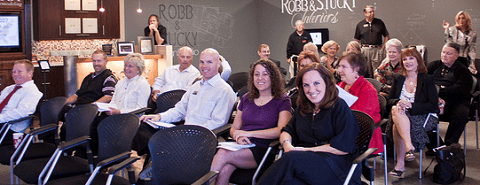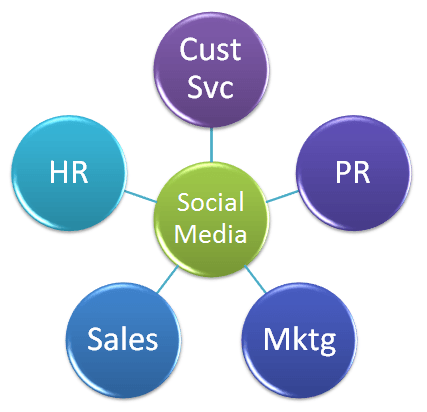This is by definition a controversial post and a bit of a rant. So I want to be clear what I’m saying, and who towards – and who I’m not talking about.
I’m not saying all PR people are destroying Social Media. I consider a number of Social Media experts with PR backgrounds to be friends of mine, and I converse with them regularly.
But there is a type of PR person in Social Media that I’ll call the Ignorant Opportunist, and these are the people who are hurting Social Media.
I’ll say more about how they’re hurting Social Media later, but in brief:
They are blocking the growth and effectiveness of Social Media, and they’re confusing both the people who need to be using it and and the people who are paying for it.

Who is the Ignorant Opportunist in Social Media PR?
Here are their characteristics:
- No background in web analytics or marketing
- No Social Media experience before 2008
- Loss of traditional PR revenue drove them to the Social Media opportunity
- They favor Twitter over all other Social Media platforms
- They think all of Social Media belongs under the PR umbrella
Opportunism Due to Decline in Demand For PR
It’s obvious how they are opportunists. Public relations for the average company has been on the decline for years (reference 1, 2, 3), and as internet marketing and analytics-based marketing grew from 2005 to 2009 (check out ANY of the charts here), more and more agencies became alarmed.
How would they replace this revenue with their existing skill base?
Social Media was the obvious answer. Especially since in its immature 2008 – 2009 form there was little agreement on how to measure Social Media or whether ROI was possible. PR people define themselves as communicators and aren’t comfortable with quantifying the effects of their communication. Or they just haven’t had the ability to do so (and AVE’s are ridiculous.)
There’s really not much difference between the PR opportunist shifting to Social Media, and the Real Estate agent, out of work due to the housing bust, getting into Social Media. In fact, you could argue that real estate agents are better conversationalists when it comes to talking to the average American.

Why PR People Think They’re The Best People For The Social Media Job, and Why They Aren’t
The rational justification was that public relations has always been involved with communicating to the public, so it would make sense for them to do so through Social Media. But in the same breath, they’ll tell you that Social Media is all about conversation and listening.
Is anyone listening to that and thinking about it?
- PR has not historically been involved in listening more than marketers have. Ever heard of market research? Marketing surveys?
- PR has not traditionally been involved in conversation, especially personalized intimate conversation. In fact, pushing press releases is exactly the kind of 1.0 push that they strongly recommend against.
- PR has not been interested in another way that digital marketers listen to and understand customers: web analytics
On the other hand…
- For a decade, digital marketers have been grappling with:
- Forum comments and discussions
- Blog comments
- Bounce rates, customer geographic data, and more…
- For more than seven or eight years, AdWords ad writers and optimizers have been:
- Dividing audiences by intent and addressing them granularly rather than as one large group. This is closer to the type of personalization required in Social Media.
- They also have seen directly in the data how different messages and copy have different effects on the audience. PR people have never had the kind of direct feedback they need to be sure that their message is received properly, is interesting, and achieves the result the corporation wants.
That means you have to be skeptical about whether any PR person is capable of personalization and optimization. Do they have the experience and mental habits to improve the results of their Social Media communications?

Why PR People Cannot Oversee And Control All Corporate Social Media
As I wrote the other day, we have a bad habit of talking about Social Media as if it’s one monolithic thing, but it’s not. Social Media is used in a variety of ways according to function, and measured differently.
Here are a few of the types of Social Media:
- Social Media PR
- Social Media Market Research
- Social Media Advertising
- Social Media Marketing
- Social Media Sales
- Social Media Customer Service
- Social Media Reputation Management
When I created a system for B2B Social Media Sales & Marketing, it became crystal clear to me that many of the biases of Social Media experts are contrary to what needs to be done for many businesses to make money with Social Media. Twitter has a very limited role for some, yet it is the exclusive preference of many Social Media gurus. LinkedIn is strongest for B2B Social Media sales but ignored by most of the PR-biased.
In fact, Twitter is growing fastest in Latin America, but you’re not going to hear a lot about that from the PR folks. That would require a granular approach and sounds suspiciously like marketing demographics. All of this has led me to conclude that those who prefer Twitter for all Social Media campaigns are basically not effective marketers- they assume that all customers are exactly like them, and that hurts their results.
I like Twitter… so everyone likes Twitter, right…? Well they should. We just need to get more of these people onto Twitter.
No, first you go where they already are hanging out, be it Facebook, LinkedIn, or other.
Social Media experts with only a PR background have no training or experience in advertising, marketing, sales, or customer service, but these are essential functions of Social Media. They cannot control all corporate Social Media without more training and experience.
What Does A Social Media Coordinator Need To Understand?
Whomever controls or coordinates your Social Media needs to have a solid basis or at least an acquaintance with, and lack of disdain for all of the following:
- Sales Processes and Priorities
- Marketing Processes and Priorities
- Customer Service Processes and Priorities
- Web Analytics and Business Metrics
- Conversion Funnels and Optimization
And unless they’re going to just be an order-taker, they need to understand the basics of business: what are its goals and priorities, how is it measured, and so on. If their priorities are different from the corporation’s and they have autonomy, that will create conflict.
As you can see, because of the breadth of Social Media’s applications, your company’s Director of Social Media should report to either the CEO or COO. They cannot report to the Director of Marketing or Sales if you have both of these. That would create conflicts. It’s not a position that fits very well into the org chart because it has applications in so many departments.
Wow, this rant is making a lot of sense.
What Kind of Damage Is The PR Bias Doing To Social Media
So here are the problems. Here’s what will happen if PR people dominate Social Media:
- No Bottom-Line Results: De-emphasis on measurement and results, lack of critical thinking and lack of strategic creativity to achieve them
- Too Much Talk: Over-emphasis on communication for the sake of communicating
- Less Executive Support: Obfuscation of the potential of Social Media ROI, discouraging it as a goal, decreasing the enthusiasm of executives for Social Media
- Lower Effectiveness: Confusion in corporate organization and control issues which decrease effectiveness of Social Media for the corporation
You may be able to think of more.
Photo credits:
- Arachnid art by oddsock
- Realtors by Dru Bloomfield – At Home in Scottsdale
- Social Media Functions by Brian Carter



